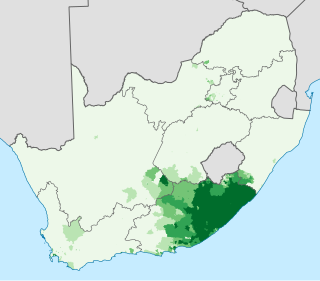| Xhosa | |
|---|---|
| isiXhosa | |
| Pronunciation | [kǁʰóːsa] |
| Native to | South Africa Lesotho |
| Region | eastern Eastern Cape; scattered communities elsewhere |
| Ethnicity | AmaXhosa |
Native speakers | 8 million (2013)[1] 11 million L2 speakers (2002)[2] |
| Latin (Xhosa alphabet) Xhosa Braille Ditema tsa Dinoko | |
| Signed Xhosa[3] | |
| Official status | |
Official language in | |
Recognised minority language in | |
| Language codes | |
| ISO 639-1 | xh |
| ISO 639-2 | xho |
| ISO 639-3 | xho |
| Glottolog | xhos1239 |
S.41[4] | |
| Linguasphere | 99-AUT-fa incl. varieties 99-AUT-faa to 99-AUT-faj + 99-AUT-fb (isiHlubi) |
 Proportion of the South African population that speaks Xhosa at home
0–20%
20–40%
40–60%
60–80%
80–100% | |
Xhosa (/ˈkɔːsə/ KAW-sə, /ˈkoʊsə/ KOH-sə;[5][6][7] Xhosa pronunciation: [kǁʰóːsa]), formerly spelled Xosa and also known by its local name isiXhosa, is a Nguni language, indigenous to Southern Africa and one of the official languages of South Africa and Zimbabwe.[8] Xhosa is spoken as a first language by approximately 8 million people and as a second language in South Africa, particularly in Eastern Cape, Western Cape, Northern Cape and Gauteng, and also in parts of Zimbabwe and Lesotho.[9] It has perhaps the heaviest functional load of click consonants in a Bantu language (approximately tied with Yeyi), with one count finding that 10% of basic vocabulary items contained a click.[10]
- ^ Xhosa at Ethnologue (26th ed., 2023)

- ^ Webb, Vic (2002). Language in South Africa: the role of language in national transformation, reconstruction and development. Impact: Studies in language and society. p. 78. ISBN 978-9-02721-849-0.
- ^ Aarons, Debra & Reynolds, Louise (2003). "South African Sign Language: Changing Policies and Practice". In Leila, Monaghan (ed.). Many Ways to be Deaf: International Variation in Deaf Communities. Washington, D.C.: Gallaudet University Press. pp. 194–210. ISBN 978-1-56368-234-6.
- ^ Jouni Filip Maho, 2009. New Updated Guthrie List Online
- ^ "Xhosa – Definition and pronunciation". Oxford Learner's Dictionaries. Oxford University Press. Retrieved 16 April 2014.
- ^ "Xhosa – pronunciation of Xhosa". Macmillan Dictionary. Macmillan Publishers Limited. Retrieved 16 April 2014.
- ^ Bauer, Laurie (2007). The Linguistics Student's Handbook. Edinburgh: Edinburgh University Press. ISBN 978-0-74862-759-2.
- ^ "Constitution of Zimbabwe (final draft)" (PDF). Kubatana.net. Archived from the original (PDF) on 2 October 2013.
The following languages, namely Chewa, Chibarwe, English, Kalanga, Koisan, Nambya, Ndau, Ndebele, Shangani, Shona, sign language, Venda, Tonga are the officially recognised languages of Zimbabwe.
- ^ "Xhosa alphabet, pronunciation and language". www.omniglot.com. Retrieved 6 July 2017.
- ^ See Sands, Bonny & Gunnink, Hilde (2019). "Clicks on the fringes of the Kalahari Basin Area". In Clem, Emily; Jenks, Peter & Sande, Hannah (eds.). Theory and Description in African Linguistics: Selected Papers from the 47th Annual Conference on African Linguistics. Berlin: Language Science Press. pp. 703–724. doi:10.5281/zenodo.3365789. ISBN 978-3-96110-205-1.